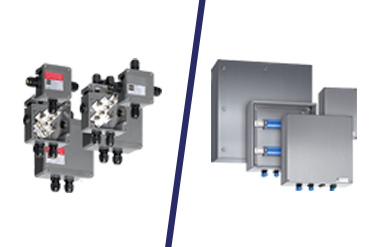Junction Boxes vs. Terminal Boxes: Choosing the Right Electrical Connection Solution

In electrical installations and wiring systems, junction boxes and terminal boxes are two essential components used to establish secure electrical connections. Though both serve similar purposes, they possess distinct characteristics and applications that cater to different scenarios. In this blog post, we will explore the differences between junction boxes and terminal boxes, their unique features, and the appropriate situations for their usage.
Junction Boxes:
A junction box is a standard enclosure crafted from metal, plastic, or fiberglass, designed to safeguard electrical connections and house wires within a concealed space. Its primary function is to prevent accidental contact with live wires, protect connections from moisture, and mitigate potential fire hazards. Inside the junction box, electrical connections are joined using wire nuts or terminal blocks.
Key Features of Junction Boxes:
- Efficient Wire Organization: Junction boxes are well-suited for managing multiple wires, facilitating proper organization and ease of troubleshooting.
- Room for Expansion: With their larger size, junction boxes can accommodate more wires and connections, making them ideal for complex installations.
- Weatherproof Options: Weatherproof junction boxes are available for outdoor applications, providing protection against environmental elements.
- Versatile Mounting Options: Junction boxes can be surface-mounted, flush-mounted, or installed within walls or ceilings.
Terminal Boxes:
Terminal boxes, also referred to as connection boxes or splice boxes, are smaller enclosures designed to house and protect electrical connections in specific locations. These boxes are commonly used in situations where electrical connections need to be readily accessible for maintenance or when space limitations require a more compact solution. Similar to junction boxes, terminal boxes are crafted from metal or plastic and come in various sizes and configurations to accommodate different wire terminations.
Key Features of Terminal Boxes:
- Space Efficiency: Terminal boxes are compact and ideal for installations with limited space, such as tight corners or machinery compartments.
- Accessible Connections: Terminal boxes offer easy access to electrical connections, making regular inspection and maintenance hassle-free.
- Simplified Design: Terminal boxes are straightforward to install and are typically used for less complex wiring setups.
- Flexible Mounting Options: Similar to junction boxes, terminal boxes offer various mounting options, including surface mounting and direct attachment to equipment or fixtures.
Application and Usage
Junction Boxes:
- Complex Wiring Systems: Junction boxes excel in installations involving multiple circuits, connections, and wire splices, providing a safe and organized solution.
- Concealed Installations: When electrical connections need to be hidden within walls, ceilings, or underground, junction boxes offer protection and safety.
- Outdoor Applications: Weatherproof junction boxes are essential for safeguarding electrical connections from moisture, making them suitable for outdoor installations.
Terminal Boxes:
- Limited Space: Terminal boxes are a perfect fit for situations where space is a concern, offering a compact and efficient solution without compromising functionality.
- Accessible Connections: Terminal boxes are preferred when easy access to electrical connections is necessary for routine inspection or maintenance.
- Simplified Wiring Setups: For straightforward installations with fewer connections, terminal boxes provide a neat and uncomplicated solution.
Both junction boxes and terminal boxes play vital roles in electrical installations, protecting and housing electrical connections. Understanding their unique characteristics and suitable applications is crucial for making the right choice for your specific wiring needs. Whether dealing with complex setups and concealed installations or requiring a space-efficient and easily accessible solution, selecting the appropriate type of box will ensure safety, efficiency, and reliability in your electrical connections.
